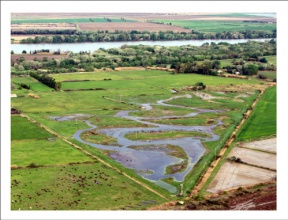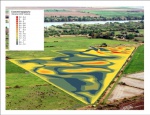Case study:Restoration of the Cassaire wetland (Rhôle delta)
This case study is pending approval by a RiverWiki administrator.
Project overview
| Status | In progress |
|---|---|
| Project web site | |
| Themes | Habitat and biodiversity, Social benefits |
| Country | France |
| Main contact forename | Jean-Laurent |
| Main contact surname | Lucchesi |
| Main contact user ID | |
| Contact organisation | |
| Contact organisation web site | |
| Partner organisations | |
| Parent multi-site project | |
| This is a parent project encompassing the following projects |
No |
Project summary
The project aims to restore an agricultural waste land in a wetland by installing typical temporary marshes and grassland vegetations of Mediterranean wetlands. The aim is also to show that the development of hunting activity is compatible with a hydraulic management respecting the natural cycle of a mediterranean temporary marsh. Various developments have been carried out on the site such as earthworks, sediment transfers for reference ecosytems and the installation of a pumping station powered by a wind turbine. This pumping station helps maintain a favorable water level for aquatic habitats and waterbirds. Horse grazing from February to August helps to maintain vegetations open.
Monitoring surveys and results
Monitoring:
- vegetation dynamics and dynamics of the seed bank
- transport of seeds (wind, water)
- birds
- counting of hunting tables
- hydrology
The former agricultural fields have been restored as temporary marshes and Mediterranean grasslands. The three objectives pursued have been globally achieved
- Ecological: increase of the heritage interest of the site
- Sociological: development of hunting activities for the inhabitants of the nearby hamlet
- Scientific: progress of knowledge in ecology of restoration
Main results:
- reclamation of a wetland destroyed by cultivation activities in the middle of the 20th century
By:
- the development of target plant communities according to hydrological conditions
- the installation of protected but not targeted species
Lessons learnt
The need to precisely control the management (hydraulic management and grazing):
- breeders do not strictly respect the demands of the managers (grazing period and grazing pressure)
- capcity of the pumping staition inferior to that announced by the manufacturer
The need to organize from the beginning:
- the monitoring at mid and long terms
- the means to ensure adaptive management in order to respond to the possible gap between the vegetation obtained and those predicted.
- The need to raise awareness (breeders, hunters) that a more environmentally friendly environment offers more irregular services than a area only managed for a particular service
Image gallery
|
Catchment and subcatchmentSelect a catchment/subcatchment
Catchment
Subcatchment
Other case studies in this subcatchment: INTERREG MED WETNET - Membership card of the Verdier Marshes-Rhone Delta Wetland Contract, MediCyn, The Verdier marshes
Site
Project background
Cost for project phases
Reasons for river restoration
Measures
MonitoringHydromorphological quality elements
Biological quality elements
Physico-chemical quality elements
Any other monitoring, e.g. social, economic
Monitoring documents
Additional documents and videos
Additional links and references
Supplementary InformationEdit Supplementary Information
| ||||||||||||||||||||||||||||||||||||||||||||||||||||||||||||||||||||||||||||||||||||||||||||||||||||||||||||||||||||||||||||||||||||||||||||||||||||||||||||||||||||||||||||||||||||||||||||||||||||||||



